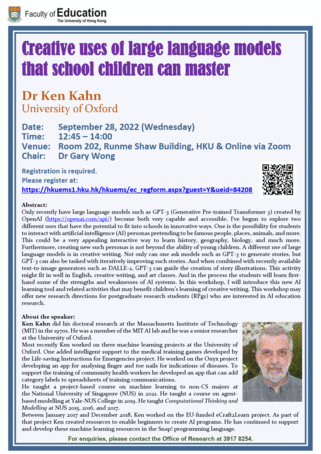Workshop: Creative uses of large language models that school children can master
Workshop
Date
September 28, 2022 (Wed)
Mode
Time
12:45 PM - 2:00 PM
Speaker

Creative uses of large language models that school schildren can master
Dr Ken Kahn
University of Oxford
Date: September 28, 2022 (Wednesday)
Time: 12:45 – 14:00
Venue: Room 202, Runme Shaw Building, HKU & Online via Zoom
Chair: Dr Gary Wong
Registration is required.
Please register at:https://hkuems1.hku.hk/hkuems/ec_regform.aspx?guest=Y&ueid=84208
Abstract:
Only recently have large language models such as GPT-3 (Generative Pre-trained Transformer 3) created by OpenAI (https://openai.com/api/) become both very capable and accessible. I've begun to explore two different uses that have the potential to fit into schools in innovative ways. One is the possibility for students to interact with artificial intelligence (AI) personas pretending to be famous people, places, animals, and more. This could be a very appealing interactive way to learn history, geography, biology, and much more. Furthermore, creating new such personas is not beyond the ability of young children. A different use of large language models is in creative writing. Not only can one ask models such as GPT-3 to generate stories, but GPT-3 can also be tasked with iteratively improving such stories. And when combined with recently available text-to-image generators such as DALLE-2, GPT-3 can guide the creation of story illustrations. This activity might fit in well in English, creative writing, and art classes. And in the process the students will learn first-hand some of the strengths and weaknesses of AI systems. In this workshop, I will introduce this new AI learning tool and related activities that may benefit children’s learning of creative writing. This workshop may offer new research directions for postgraduate research students (RPgs) who are interested in AI education research.
About the speaker:
Ken Kahn did his doctoral research at the Massachusetts Institute of Technology (MIT) in the 1970s. He was a member of the MIT AI lab and he was a senior researcher at the University of Oxford.
Most recently Ken worked on three machine learning projects at the University of Oxford. One added intelligent support to the medical training games developed by the Life-saving Instructions for Emergencies project. He worked on the Onyx project developing an app for analysing finger and toe nails for indications of diseases. To support the training of community health workers he developed an app that can add category labels to spreadsheets of training communications.
He taught a project-based course on machine learning to non-CS majors at the National University of Singapore (NUS) in 2021. He taught a course on agent-based modelling at Yale-NUS College in 2019. He taught Computational Thinking and Modelling at NUS 2015, 2016, and 2017.
Between January 2017 and December 2018, Ken worked on the EU-funded eCraft2Learn project. As part of that project Ken created resources to enable beginners to create AI programs. He has continued to support and develop these machine learning resources in the Snap! programming language.
For enquiries, please contact the Office of Research at 3917 8254.
You may also be interested in
- 30Sep

“EEG+AI” Competition
Date:September 30, 2022 (Fri)
Event typecampaign-scheme, others
- 30Sep

China’s Ethnic Minority Educational Preferential Policy at the Crossroads – A Case Study of the Bonus Score Policy: More, Less or Gone?
Date:September 30, 2022 (Friday)
Time:3:00 PM - 4:00 PM
Event typeseminar, webinar
- 30Sep

Webinar: Interpretations of ‘research’, ‘researchers’ and ‘research excellence’ in international research assessment systems
Date:September 30, 2022 (Fri)
Time:4:30 PM - 5:30 PM
SpeakerProfessor Alis OanceaEvent typewebinar
